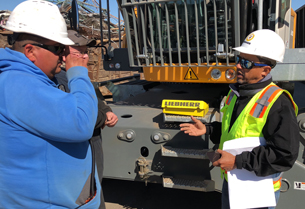Quick couplers are key tools on every jobsite that assist you with rapidly switching between your heavy
equipment attachments. Using them the right way can help reduce the risk of injury and machine damage on the
job, and they'll make your operation more efficient. However, improper use or neglecting maintenance can
lead to costly repairs or even complete failure. To prevent any issues with your quick couplers, follow our
tips and make sure you are taking proper precautions when working with them on your next project.
Here are the critical maintenance and operating best practices that you should adhere
to with your quick coupler:
- Train operators on quick coupler use
- Perform daily visual inspections
- Stick to compatible attachments
- Lubricate moving parts regularly
- Watch for hydraulic system issues
- Store quick couplers the right way
Train operators on quick coupler use
Proper training is the foundation of effective and efficient use of all attachments and equipment, including
quick couplers. Operators have to be familiar with what constitutes normal operation, abnormal operation,
and need to recognize any potential issues. For each specific quick coupler they use, your crew should be
trained in the following:
- Attachment engagement procedures
- Being alert for irregular noises or movement
- What steps to take and who to notify when they notice any problems
Supervisors must constantly assess operator knowledge and reinforce safety protocols.
Perform daily visual inspections
Before beginning work each shift, you should look over the quick coupler and check all connection points. A
quick walkaround can help you catch early signs of damage before they become larger problems. Things to
watch out for include:
- Visible wear or cracking on the coupler body
- Loose hardware or unusual gaps
- Debris buildup around moving parts
- Leaking hydraulic fluid
Stick to compatible heavy equipment attachments
It's important to not operate heavy equipment attachments that exceed the limits outlined by the excavator
or quick coupler manufacturers. For example, not all quick couplers are approved for the use of hydraulic
breakers. Incompatible attachments can place dangerous levels of stress on the coupler and your machine's
hydraulic system, leading to loss of control or premature failure. Always check your owner's manual or contact our team today if you're not sure about a particular attachment and
its compatibility with your coupler.
Lubricate moving parts regularly
Friction and dirt are your quick coupler's worst enemies. Lubrication should be part of your overall
maintenance routine, especially in dusty, muddy, or wet environments. Proper grease application keeps moving
parts operating smoothly and helps prevent abnormal wear and tear. Apply high quality grease to:
- Coupler locking mechanisms
- Pivot points
- Pins and bushings (if applicable)
Watch for hydraulic system issues
Hydraulic quick couplers rely on clean, pressurized fluid to function effectively. To maintain your
equipment's hydraulic performance, here are simple best practices to follow:
- Check for leaks or drips around hoses and fittings
- Wipe down dirty connections before disconnection to prevent contamination
- Inspect O-rings and seals for cracking or damage
- Use caps or plugs immediately after disconnection to avoid debris entering the system
Store quick couplers the right way
We recommend removing your quick coupler away from active work areas to minimize the chances of
unintentional collisions or other accidents during the changeout process. Once removed, it's important to:
- Set it down on a clean, stable surface
- Fully release all hydraulic pressure
- Plug or cap hydraulic lines to prevent contamination
- Clean off any mud, dust, and debris
Quick couplers are built for convenience, but maintaining them requires diligence. By training your crew,
inspecting equipment regularly, and following the manufacturer's guidelines, you can keep your quick coupler
system running smoothly.
If you have any questions about using a quick coupler or other heavy equipment attachments, contact our team today.



